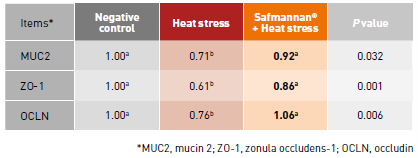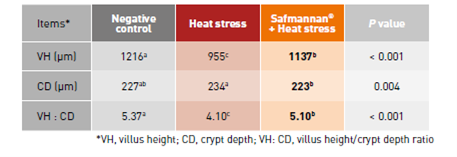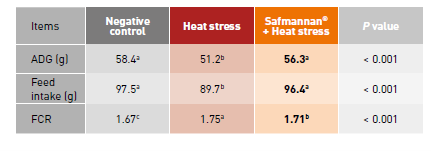20 May Protecting broiler gut health and performance under heat stress
By Dr. Alain RIGGI, DVM, Global poultry manager & Lin WANG, Global poultry program manager
Heat stress poses a significant challenge for the poultry industry, with substantial impacts on broiler performance, health, and welfare. At the core of this issue is the disruption to the homeostasis of the broiler’s intestinal ecosystem, which can be severely impacted by the physiological changes induced by high temperatures and humidity.
Heat Stress and Disruption of Intestinal Homeostasis in Broilers
When broilers are exposed to heat stress, a cascade of physiological changes occurs that can compromise the structure and function of the intestinal tract. Increased body temperature, altered blood flow, and hormonal imbalances all contribute to the breakdown of the intestinal barrier.
One of the key features of heat stress-induced gut dysfunction is “leaky gut” syndrome. Heat stress has been shown to decrease the expression of tight junction proteins, such as claudin and occludin, which are responsible for maintaining the integrity of the intestinal epithelium. Cheng et al., found that heat stress significantly reduced the gene expression levels of claudin-5 and zonula occludens-1 (ZO-1) in the ileum of broilers, compared to the non-challenged control group.
Heat stress also impairs the secretion of mucins, the main component of the mucus layer which covers, and thus protects, the intestinal tract. Cheng et al., observed that heat-stressed broilers exhibited a significant decrease in the mRNA expression of mucin 2 in the ileum, compared to the negative control group.
The consequences of heat stress-induced gut dysfunction are extensive. Damage to the intestinal epithelium and barrier impairment can lead to poor nutrient absorption, reduced growth rates, and suboptimal feed efficiency, and substantial economical loss for poultry producers. The increased permeability of the gut also triggers the translocation of bacterial endotoxins, triggering systemic inflammation and oxidative stress that further compromise broiler health and welfare.
Yeast postbiotic : A Promising Approach
Recognizing the critical importance of maintaining gut integrity under heat stress conditions, researchers have explored the use of specialized dietary solutions, such as yeast postbiotics, to support birds’ intestinal homeostasis and function.
Safmannan®, a premium quality yeast postbiotic, has been specifically developed to support birds’ intestinal homeostasis, under various challenging conditions, such as heat stress. Numerous studies conducted in different areas around the globe have confirmed the positive effect of Safmannan® on mitigating the detrimental effects of heat stress on broilers. Safmannan® has been shown to preserve the structural and functional integrity of the intestinal tract, even under severe heat stress challenges.
Study conducted by Cheng et al., demonstrated that broilers fed with the postbiotic and subjected to the same heat stress challenge exhibited statistically similar levels of tight junction-associated proteins, such as claudin-5 and ZO-1, as the negative non-challenged control group (Fig. 1). This suggests that the postbiotic can help strengthen the gut integrity and reduce the risk of leaky gut induced by heat stress.

Moreover, the same study showed that the postbiotic helped preserve the mRNA expression of mucin 2 in the ileum of heat-stressed broilers, maintaining it at a level similar to the negative non-challenged control group (Fig.1). This indicates that the postbiotic can help support the gut barrier function by maintaining the production of protective mucus.
Incorporating Safmannan®, the reference postbiotic, into a comprehensive heat stress management program can unlock a range of benefits for broiler producers, including:
- Preserved gut morphology
Heat stress is known to induce significant damage to the gut morphology of broilers, which can reduce their ability to absorb nutrients. Cheng et al., found that the birds in the heat stress-challenged control group had significantly reduced (P < 0.05) villus height (VH) along with a 23.6% reduction in the ratio of VH to crypt depth when compared to the non-challenged negative control group (Fig. 2).
In contrast, the administration of Safmannan® alleviated these reductions, resulting in a 19.1% increase in VH and a 24.4% increase in the VH to crypt depth ratio in the ileum of broilers, compared to the birds in the heat stress-challenged control group (Fig. 2). When compared to the birds in the non-challenged control group, broilers that received Safmannan® supplementation exhibited statistically the same gut morphology, indicating a preserved ability to absorb nutrients and maintain proper digestive function.

- Improved growth performance and feed efficiency:
Studies have shown consistent positive effects of Safmannan® on broilers’ production performance under different levels of heat stress. Cheng and al., found that in addition to the positive impact on broilers’ gut health and function, Safmannan® had demonstrated significant positive effects on production performance, such as feed efficiency and growth. The birds fed with the postbiotic under severe heat stress exhibited a significant 10% improvement in average daily gain and a significant 4 point improvement in feed conversion ratio (FCR) compared to heat-stressed birds without the postbiotic (Fig. 3).

Conclusion
As the poultry industry continues to navigate the complexities of heat stress, the strategic use of reliable dietary solutions, such as Safmannan®, can be a valuable component of a comprehensive heat stress management program. By protecting the integrity of the broiler’s intestinal tract, producers can unlock a range of benefits that contribute to sustainable and profitable broiler production while ensuring the well-being of the animals under heat stress challenge.
Reference:
- Cheng et al., Dietary mannan oligosaccharide ameliorates cyclic heat stress-induced damages on intestinal oxidative status and barrier integrity of broilers. Poult Sci. 2019 Oct 1;98(10):4767-4776. doi: 10.3382/ps/pez192. PMID: 31005999.
About Phileo
We daily support our partners, from global industry players to family farmers, in their transition towards sustainable good practices. With them, we develop tailor-made solutions for preventive care allowing a limited and responsible use of antibiotics by mastering microbiota and immunity. Our shared ambition is to raise healthy animals while sparing planet resources and energy. Our rich collection of proprietary probiotic strains allows us to develop evidence-based solutions taking into account animal species’ diversity ranging from pets, livestock, poultry, fish to insects to overcome the increasing complexity of food production.
Let’s act with nature for animal care
Press contact Phileo by Lesaffre: Clementine Mariën – c.marien@phileo.lesaffre.com
To learn more about Phileo, please visit www.phileo-lesaffre.com







Sorry, the comment form is closed at this time.